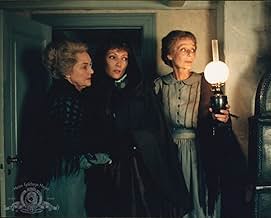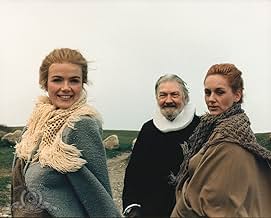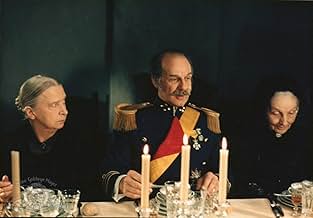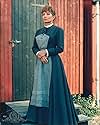IMDb-BEWERTUNG
7,8/10
23.074
IHRE BEWERTUNG
Eine strenge Religionsgemeinschaft in einem dänischen Dorf nimmt einen französischen Flüchtling aus dem französisch-preußischen Krieg als Diener der Töchter des verstorbenen Pfarrers auf.Eine strenge Religionsgemeinschaft in einem dänischen Dorf nimmt einen französischen Flüchtling aus dem französisch-preußischen Krieg als Diener der Töchter des verstorbenen Pfarrers auf.Eine strenge Religionsgemeinschaft in einem dänischen Dorf nimmt einen französischen Flüchtling aus dem französisch-preußischen Krieg als Diener der Töchter des verstorbenen Pfarrers auf.
- Regie
- Drehbuch
- Hauptbesetzung
- 1 Oscar gewonnen
- 11 Gewinne & 8 Nominierungen insgesamt
Stéphane Audran
- Babette Hersant
- (as Stephane Audran)
Jean-Philippe Lafont
- Achille Papin
- (as Jean Philippe Lafont)
Ghita Nørby
- Narrator
- (Synchronisation)
Asta Esper Hagen Andersen
- Anna
- (as Asta Esper Andersen)
Empfohlene Bewertungen
Stephane Audran is the eponymous heroine of this beautifully measured study of a small Danish community towards the end of the last century. Two beautiful and musically talented sisters give-up their own prospects of happiness and marriage in order to look-after their ageing father. One day, a French woman, Babette, comes to work for them. After some years she wins the lottery and is determined to do something for the sisters who have taken her in. Her solution is to prepare an exquisite and sumptuous feast, which changes the lives of all those invited. This is a film about human and cultural interaction, reflected in the changing language of the dialogue from Danish to French, and especially between the dutiful sobriety of Protestant northern Europe and the sensuousness of the Catholic south. It is also about human needs, and how warmth and kindness can be expressed and stimulated through the cultivation of the senses. A profoundly uplifting film.
This delicately told and moving story about the two devout daughters of a Danish Lutheran minister and their French servant is one of the finest European films of the 1980s. Set in a small, remote, austere Danish seaside town in the mid-19th century, the daughters devote their lives to continuing the work of their father in service of God, and in care for their needy townspeople. One of the daughters had turned down a promising opera career -- and the love of her French voice coach (a famous opera singer himself) -- to remain with her father and the town. Many years later the French singer sends a woman (Babette) -- who had lost her family in an outbreak of civil war -- to live with the sisters. She turns out to be an excellent cook, housekeeper and a shrewd shopper. The story culminates in a sumptuous feast prepared by Babette coinciding with a memorial to the reverend minister's 100th birthday. This delicious screenplay was adapted from the Isak Denisson (pen name for Karen Blixen) short story originally published in the Ladies Home Journal.
It has started quietly. If your are looking for an action-packed movie this is absolutely not the right choice. All characters are slowly depicted on the scene. Stroke after stroke on the scene canvas. None can take away his hands to the priest and so the sisters lifespan devotion can only remain into the village. Philippa and Martina know their destiny, belong only to the village. So when you understand that, you are on the movie scene, in the village that becomes the whole known world in that time. When, no technology can let you imagine anything else than the campaign, the village, the sea. You feel the rhythm of that ancient village's life. Watching the movie in a cold snowy late afternoon can cause you to approach this evening dinner with some sumptuous expectations ...
The final sentence that give a title to Babette's sacrifice far from Paris: An artist is never poor.
Superb photography. Many situations depict portraits and landscapes as they were styled on canvas there, in Jutland, in 18th century.
The final sentence that give a title to Babette's sacrifice far from Paris: An artist is never poor.
Superb photography. Many situations depict portraits and landscapes as they were styled on canvas there, in Jutland, in 18th century.
Flawlessly directed, written, performed, and filmed, this quiet and unpretentious Danish film is an example of cinema at its best, and if a person exists who can watch BABETTE'S FEAST without being touched at a very fundamental level, they are a person I do not care to know.
The story is quite simple. In the 1800s, two elderly maiden ladies (Birgitte Federspiel and Bodil Kjer) reside in remote Jutland, where they have sacrificed their lives, romantic possibilities, and personal happiness in order to continue their long-dead father's religious ministry to the small flock he served. One of the women's youthful admirers sends to them a Frenchwoman, Babette (Stéphane Audran), whose husband and son have been killed in France and who has fled her homeland lest she meet the same fate. Although they do not really require her services, the sisters engage her as maid and cook--and as the years pass her cleverness and tireless efforts on their behalf enables the aging congregation to remain together and the sisters to live in more comfort than they had imagined; indeed, the entire village admires and depends upon her.
One day, however, Babette receives a letter: she has won a lottery and is now, by village standards, a wealthy woman. Knowing that her new wealth will mean her return to France, the sisters grant her wish that she be allowed to prepare a truly French meal for them and the members of their tiny congregation. The meal and the evening it is served is indeed a night to remember--but not for reasons that might be expected, for Babette's feast proves to be food for both body and soul, and is ultimately her gift of love to the women who took her in and the villagers who have been so kind to her.
The film is extraordinary in every way, meticulous in detail yet not overpowering in its presentation of them. As the film progresses, we come to love the characters in both their simple devotion to God and their all-too-human frailties, and the scenes in which Babette prepares her feast and in which the meal is consumed are powerful, beautiful, and incredibly memorable. There have been several films that have used food as a metaphor for love, but none approach the simple artistry and beauty of BABETTE'S FEAST, which reminds us of all the good things about humanity and which proves food for both body and soul. Highly, highly recommended.
Gary F. Taylor, aka GFT, Amazon Reviewer
The story is quite simple. In the 1800s, two elderly maiden ladies (Birgitte Federspiel and Bodil Kjer) reside in remote Jutland, where they have sacrificed their lives, romantic possibilities, and personal happiness in order to continue their long-dead father's religious ministry to the small flock he served. One of the women's youthful admirers sends to them a Frenchwoman, Babette (Stéphane Audran), whose husband and son have been killed in France and who has fled her homeland lest she meet the same fate. Although they do not really require her services, the sisters engage her as maid and cook--and as the years pass her cleverness and tireless efforts on their behalf enables the aging congregation to remain together and the sisters to live in more comfort than they had imagined; indeed, the entire village admires and depends upon her.
One day, however, Babette receives a letter: she has won a lottery and is now, by village standards, a wealthy woman. Knowing that her new wealth will mean her return to France, the sisters grant her wish that she be allowed to prepare a truly French meal for them and the members of their tiny congregation. The meal and the evening it is served is indeed a night to remember--but not for reasons that might be expected, for Babette's feast proves to be food for both body and soul, and is ultimately her gift of love to the women who took her in and the villagers who have been so kind to her.
The film is extraordinary in every way, meticulous in detail yet not overpowering in its presentation of them. As the film progresses, we come to love the characters in both their simple devotion to God and their all-too-human frailties, and the scenes in which Babette prepares her feast and in which the meal is consumed are powerful, beautiful, and incredibly memorable. There have been several films that have used food as a metaphor for love, but none approach the simple artistry and beauty of BABETTE'S FEAST, which reminds us of all the good things about humanity and which proves food for both body and soul. Highly, highly recommended.
Gary F. Taylor, aka GFT, Amazon Reviewer
One evening when I was working in the lab, I developed this intense pang of hunger. I decided to go downstairs to the cafeteria and scrap together a dinner when I noticed a few random folk gathered in front of the adjacent theater. Since the building was usually empty by that hour I couldn't help feeling curious and since I always eavesdrop on conversations I soon discovered that they were showing old films in the theater. So, I bought a few vendor snacks and decided to join them for a viewing. That was one of the best work related decisions I ever made as an undergrad. That movie made me reconsider my second shift job at the lab and check out enrollment into the local culinary art schools. Well, I didn't become a chef but I did abandon biology for a more creative outlet and realized that being home before dinner is an important part of better living. Babette's Feast - a movie that had me reevaluate my life and consider a career change. How many flicks do that? Best movie ever.
Wusstest du schon
- WissenswertesFirst Danish movie to win an Academy Award for best foreign language film.
- PatzerIn 1871 Babette pays with skilling, which was the currency used at that time; 14 years later, Babette still uses skilling, but Denmark changed the currency in 1875 from skilling to kroner and orer.
- VerbindungenEdited into Eventyret om dansk film 18: Nye perspektiver - 1970-1987 (1996)
- SoundtracksWaltz No. 15 in A-flat major Op. 39
(arranged for orchestra) (uncredited)
Written by Johannes Brahms
Played during the dance hosted by the Royal family
Top-Auswahl
Melde dich zum Bewerten an und greife auf die Watchlist für personalisierte Empfehlungen zu.
Details
- Erscheinungsdatum
- Herkunftsland
- Sprachen
- Auch bekannt als
- El festín de Babette
- Drehorte
- Produktionsfirmen
- Weitere beteiligte Unternehmen bei IMDbPro anzeigen
Box Office
- Bruttoertrag in den USA und Kanada
- 4.398.938 $
- Weltweiter Bruttoertrag
- 4.637.920 $
- Laufzeit1 Stunde 43 Minuten
- Sound-Mix
- Seitenverhältnis
- 1.66 : 1
Zu dieser Seite beitragen
Bearbeitung vorschlagen oder fehlenden Inhalt hinzufügen
































